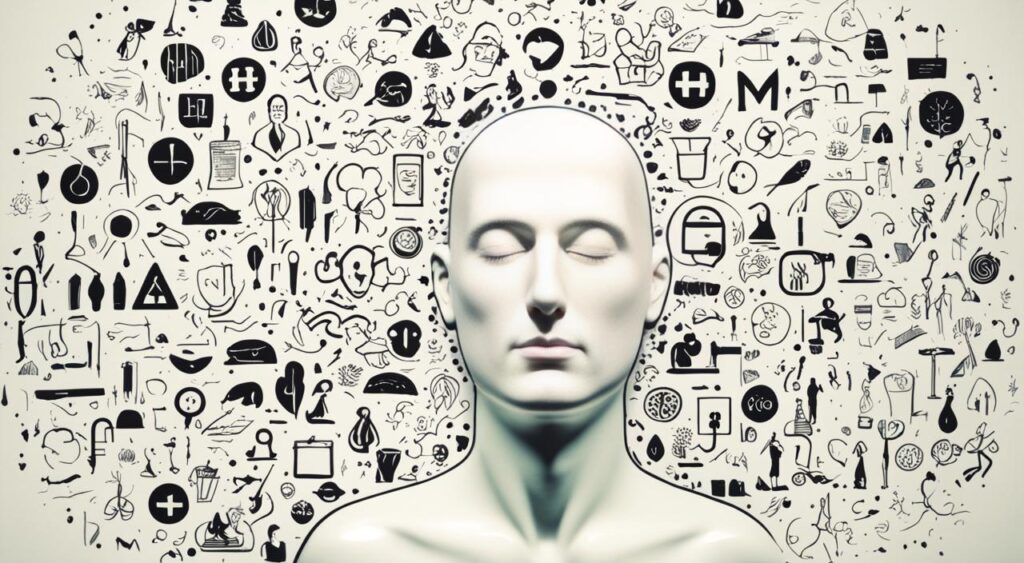Mental illness, or mental health disorders, is a range of conditions. They impact your mood, thinking, and how you act. This includes depression, anxiety, eating disorders, and addictions. Around 1 in 5 people in the U.S. deal with a mental health disorder yearly. These issues can affect daily life at work, school, and with others.
The symptoms can change, but include mood swings, confusion, and feeling tired. Mental health problems can get worse without help. Genetics, environment, and life experiences play a part in developing these disorders.
Getting the right help is crucial as these disorders can’t be solved alone. Usually, people use a mix of medication and therapy to manage. Also, improving your lifestyle and finding support from others can help a lot.
Key Takeaways
- Mental health disorders are a wide range of conditions that affect mood, thinking, and behavior.
- Mental illness is common, affecting around 1 in 5 U.S. adults in a given year.
- Mental health disorders can significantly impact daily functioning in emotional, psychological, and social aspects of life.
- Seeking professional help is crucial, as mental illnesses often worsen without treatment.
- Effective management of mental health disorders often involves a combination of treatments and lifestyle changes.
Understanding Mental Health Disorders
Mental health disorders are known as mental illnesses. They cover a wide range of conditions. These conditions can really change how a person feels, thinks, and acts. As a result, the person might struggle to go about their daily life. Many common mental health disorders exist. These include depression, anxiety, and eating disorders.
Definition of Mental Health Disorders
Mental health disorders are real and diagnosable. World health organization affect how a person feels inside, their mind, and how they interact with others. Having a mental health disorder often means dealing with changes in mood, thoughts, and actions. These changes can make dealing with everyday life tough generalized anxiety disorder.
Types of Mental Health Disorders
Mental health disorders come in many forms, each affecting people differently. Common types are depression and various anxiety disorders. There’s also bipolar disorder, schizophrenia, PTSD, OCD, and eating disorders.
Prevalence and Statistics
Around 1 in 5 adults in the U.S. have a mental illness each year. These illnesses don’t pick based on age, gender, or how much money someone makes. They’re a big reason people can’t work or enjoy life fully. It’s key to know how common these disorders are. This awareness helps in tackling this public health challenge.
Impact on Daily Functioning

Mental health disorders can change how a person lives and acts every day. They can cause emotions like sadness, confusion, and feeling bad about oneself. These make behavioral health hard to handle stress, stay motivated, and enjoy things we usually like obsessive-compulsive disorder.
Emotional and Psychological Effects
People with mental health issues might feel really low, affective disorder, have mood swings, and find it hard to keep emotions in check. This can lower how much work they get done, make them pull away from others, and reduce their happiness. The signs of mental and physical stress can stop them from doing well in different parts of life statistical manual of mental disorders.
Social and Interpersonal Consequences
Mental health problems can hurt relationships with others. They can make people less kind, more distant, and struggle to get along with others. This can cause fights and feeling alone. Figuring out how to connect with others can get tough, which makes the mental illness even harder to bear many different types of mental.
Work and Academic Performance
The effects can show up at school or work, too. It can cause problems focusing, keep you from being motivated, and make you feel unstable major depressive disorder. These issues can stop you from doing well or even just getting things done. It can harm how much you achieve in school or on your job.
Understanding how much mental health can change life is key to getting help. By trying to deal with the feelings, actions, and job or school problems, people can start to feel better. Improving mental health can make everything in life more positive.
Mental Health Disorders and Physical Health

Mental health and physical health go hand in hand. People with mental health conditions are at higher risk for chronic illnesses health and social. These include diabetes, heart disease, cancer, and lung problems.
The link between mental and physical health is complicated. Both types of health affect each other.
Increased Risk of Chronic Conditions
Studies find a strong connection between mental health disorders and chronic illnesses. Several reasons play a part, like common biological pathways and effects of mental illness on health behaviors.
Helping someone manage both their mental and physical health is vital for their well-being.
Sleep Disturbances
Many with mental health disorders struggle with sleep. They might not sleep well, have sleep apnea, or sleep at odd times. These sleep problems make mental illness symptoms worse and can cause more health issues.
Focusing on good sleep is key to addressing mental health disorders.
Unhealthy Coping Mechanisms
If someone has a mental health condition, they might pick bad ways to cope. This includes using drugs, eating too much, or not moving enough. These actions can harm their body, making health issues worse.
Telling folks about good ways to cope and live is crucial to help those with mental health disorders stay healthy.
| Condition | Increased Risk for Individuals with Mental Health Disorders |
|---|---|
| Diabetes | 2-3 times higher |
| Cardiovascular Disease | 1.5-2 times higher |
| Respiratory Illnesses | 2-3 times higher |
| Cancer | 1.2-1.5 times higher |
Mental Health Disorder
Mental health disorders cover a broad list of conditions. They greatly affect how someone thinks, feels, and acts. It’s common, with nearly half of all U.S. adults facing a mental illness at some point. Knowing about these disorders, their risks, and related issues is key to stop them early and treat them fully.
Common Mental Health Disorders
Some widespread mental health issues are depression, anxiety disorders, bipolar disorder, and more. They can cause emotional ups and downs, behavioral changes, and make everyday life tough. Recognizing their signs is the first step to get proper help and support.
Risk Factors and Causes
The causes of mental health issues are complex. Many factors like genes, environment, and brain chemistry play a role. Early life experiences can also shape issues like autism spectrum disorder. Other risks include stress, trauma, and health problems. Knowing these risks helps find and treat the main causes of disorders.
Comorbidity with Other Conditions
Mentall health problems often come with other health issues, called comorbidity. So, someone might face both a mental health disorder and a physical one like cardiovascular disease. This link shows why it’s vital to treat the whole person, not just their mental or physical health.
Recognizing Signs and Symptoms
It’s important to know the signs and symptoms of mental health issues. They vary but usually involve changes in feelings, actions, and body reactions. These changes can majorly affect daily life obsessive-compulsive disorder.
Emotional and Behavioral Changes
People with mental health disorders might show big changes in emotions and actions. You might see constant sadness, worry, or anger. They may find it hard to focus, have mood swings, and their sleep or eating habits might change too. They could start avoiding people, be more risky, or find simple tasks hard to handle.
Physical Manifestations
Mental illnesses also show in physical ways. This can mean headaches, feeling tired, tense muscles, stomach problems, and changes in how much energy someone has. Physical symptoms make dealing with mental health issues even harder.
Knowing the many symptoms can help people reach out for help. Getting the right care and support is key in improving both mental and physical health.
Seeking Professional Help

When individuals start to show signs of depression, anxiety, or serious mental health issues, it’s important to reach out for help.
Getting help early on can change the future of the situation. Therapists, counselors, and psychiatrists offer personalized plans. They aim to meet the individual’s unique needs.
Importance of Early Intervention
Getting help as soon as you see a problem can lead to better results. You get to start effective treatments faster. This can stop things from getting worse. It also reduces how much the problem affects your life, relationships, and well-being.
Types of Treatment Options
The right treatment depends on the condition, its seriousness, and what you prefer. Treatments could involve:
- Cognitive-behavioral therapy (CBT), interpersonal therapy, and family therapy
- Antidepressants, anti-anxiety medications, and mood stabilizers as medicine
- Mindfulness, meditation, and stress management for complementary help
- Getting help from support groups or talking with others who’ve been through similar things
- Kinds of therapy that require staying at the hospital or going to a special program if the issue is more severe
Mental health professionals help find the best treatments. They guide you through choosing the option that will work best for you.
Managing Mental Health Disorders
To manage mental health disorders, a mix of tactics is key. This includes changing lifestyle habits. These changes help support good health and tackle symptoms.
Lifestyle Changes
Good habits can really help people with mental health conditions. Things like working out, eating well, and getting enough sleep are vital. These activities help you feel better, boost energy, and sleep well. Plus, relaxing activities like meditation do wonders for beating anxiety and sadness.
Building a Support System
Finding a good support network is crucial. This means connecting with loved ones face-to-face or online. It’s about sharing, getting support, and feeling like you belong. Professional help from therapists can also be key in dealing with your disorder.
Coping Strategies
It’s important to have good ways to cope. Writing, hobbies, and taking care of yourself are excellent strategies. CBT can also teach you how to handle the tough feelings and thoughts that come with your disorder.
Also Read: Academic Excellence: Ranking The Best Medical Schools In The US
Mental Health and Relationships
Mental health issues can deeply impact how we connect with loved ones. They lead to significant challenges in our relationships. These challenges come from the emotional and behavioral changes we go through.
Impact on Family and Friends
If someone in your life is struggling with mental health, you might feel at a loss. You could feel frustrated, upset, or distant due to their condition. It’s common to see breakdowns in talking and more fights. It can make both you and your loved one feel very alone.
Maintaining Healthy Relationships
Keeping healthy relationships with a mental health issue means you have to be mindful. Being open, setting boundaries, and getting support are all key. People with these conditions should also involve their close ones in their care.
This way, with some time and effort, these relationships can stay strong. They can remain meaningful and impactful, even with the challenges of mental illness.
FAQs
Q: What are some common types of mental disorders?
A: Some common types of mental disorders include schizophrenia, post-traumatic stress disorder, anxiety disorder, bipolar disorder, and eating disorders.
Q: How do mental health disorders affect daily life?
A: Mental health disorders can impact daily life by affecting a person’s mood, behavior, and ability to function in various aspects such as work, relationships, and self-care.
Q: What are the symptoms and causes of mental disorders?
A: Symptoms of mental disorders vary depending on the specific disorder but can include changes in mood, behavior, and thought patterns. Causes may be genetic, environmental, or a combination of both.
Q: How are mental disorders related to mental health conditions?
A: Mental disorders are specific conditions that affect an individual’s mental health. They can impact a person’s thoughts, feelings, and behaviors, leading to distress and impairment in daily functioning.
Q: What is the difference between a personality disorder and a mental disorder?
A: A personality disorder is a type of mental disorder that involves enduring patterns of behavior, cognition, and inner experience that deviate from cultural norms. Mental disorders, on the other hand, encompass a wider range of conditions affecting mental health.
Q: How common are mental disorders?
A: Mental disorders are common worldwide, with millions of people affected by various conditions each year. They can impact individuals of all ages, backgrounds, and cultures.
Q: How can mental health care help individuals with mental disorders?
A: Mental health care provides support and treatment options for individuals with mental disorders. This can include therapy, medication, support groups, and lifestyle changes to improve overall well-being.
Source Links
- https://www.cdc.gov/mentalhealth/learn/index.htm
- https://www.mayoclinic.org/diseases-conditions/mental-illness/symptoms-causes/syc-20374968
- https://www.webmd.com/mental-health/how-does-mental-health-affect-physical-health





